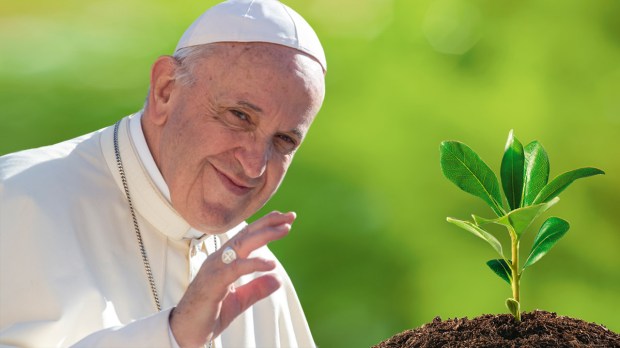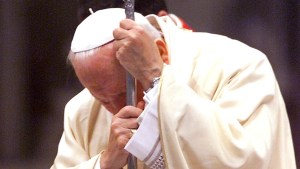1 – Arrival at Edmonton airport
The Pope’s plane, chartered by ITA Airways, will take off from Rome-Fiumicino International Airport at 9 a.m. on July 24. On board the plane will be 78 journalists – including one from I.MEDIA.
The plane will land at Edmonton International Airport, capital of the province of Alberta, at 11:20 a.m. (-6 UTC), after a flight of more than 10 hours – the longest of the trip. The program there does not include any official events, except for a welcome at the airport by the country’s civil and ecclesial authorities. Because of the Pope’s health – he is still suffering from his right knee – the program for this Canadian tour has been reduced.

2- Maskwacis and the Ermineskin residential school
The next day, July 25, Pope Francis will travel to the town of Maskwacis, about 100 km (60 miles) south of Edmonton, where the former Ermineskin Residential School is located. At 10:00 a.m., he will meet with First Nations, Métis and Inuit peoples, as well as thousands of former residential school students from across the country. He will deliver his first speech.
Alberta had the largest number of residential schools in Canada with 26, according to the University of Manitoba’s National Centre for Truth and Reconciliation (NCTR) website.
The Ermineskin residential school, one of the largest in the country, operated from 1916 to 1975. According to the CNVR, overcrowding and disease were common. Students who passed through the school reported regular physical abuse when they expressed their indigenous culture. At least 15 students died during the 59 years of the school’s existence.
3- Sacred Heart of the First Peoples Church
On the afternoon of July 25, at 4:45 p.m., Pope Francis will return to Edmonton to deliver a speech at the Sacred Heart of the First Peoples Church and greet the parish community and the aboriginal population.
The parish website says it is a “unique Catholic community of aboriginal peoples and settlers, who pray together using unique symbols, music and rituals.” For example, they use “fragrant oats, sage, cedar and tobacco, as well as drums” in their liturgy.
Opened in 1913, the 109-year-old building is one of the oldest churches in Edmonton. In 1991, the archbishop officially entrusted the church to the Edmonton First Nations, Métis and Inuit.
In August 2020, the church suffered a devastating fire caused by the burning of sage and ashes from a traditional ceremony. Reconstruction of the church began in November 2021 at a cost of about 3.4 million euros, the parish website details. The new church is to “better reflect indigenous cultures.” Tipi poles are to be erected above the altar, which itself is to be made from a tree trunk base.
4- Commonwealth Stadium
On July 26, the liturgical feast of St. Anne, the country’s patron saint, the Pontiff will celebrate a mass at 10:15 a.m. at Edmonton’s Commonwealth Stadium, where he will deliver a homily. The building has a capacity of 65,000. It was built in 1975 and opened in 1978. According to the travel site, the celebration will incorporate elements of Aboriginal culture.
5- Lake Saint Anne
At 5:00 p.m. Pope Francis will travel to Lac Sainte Anne, 75 km from Edmonton. He will participate in a pilgrimage organized every year since 1886 in honor of Saint Anne and will deliver a homily. Tens of thousands of Cree, Dene, Blackfoot and Métis, who have a special devotion to the grandmother of Jesus – symbolizing the importance of the elder figure in their communities – traditionally attend this gathering.
According to the shrine’s website, about 40,000 people come to this pilgrimage each year. Traditionally, pilgrims bathe in the lake, including many sick and suffering people. In some of the local indigenous languages, the lake is called “Lake of God” or “Lake of Spirits.”
The first church built on the shores of the lake that became a shrine dedicated to the saint was built in 1844. The community that was then established in this area, consisting of a priest and some Métis, was the first permanent Catholic mission in Alberta. Since 1852, the Missionary Oblates of Mary Immaculate have been serving the shrine.
6- Arrival at the Jean-Lesage airport in Quebec City
On the morning of July 27, the Pope’s plane will leave Edmonton International Airport at 9:00 a.m. for Quebec City, more than 3,000 km (1,865 mi) to the east. The arrival at the Jean-Lesage International Airport in Quebec City is scheduled for 3:05 pm local time (-4 UTC).
7- The “Citadelle of Quebec”: residence of the Governor General
The rest of the afternoon of July 27, starting at 3:40 p.m., will be devoted to meetings with Canadian authorities. Pope Francis will meet with the Governor General of Canada, Mary Simon, Prime Minister Justin Trudeau, the country’s civil authorities and Aboriginal representatives. At 4:45 p.m., he will deliver a speech.
All of these meetings take place at the “Citadelle of Québec,” a star-shaped military building facing the St. Lawrence River. It is the official residence of Queen Elizabeth II and the Governor General.
The French and British erected numerous fortifications at this location. The present building was built between 1820 and 1850. Nicknamed the “Gibraltar of America,” the Citadel is still an active garrison today. It was established on the highest natural point in Quebec City, Cap Diamant, to better defend the city from attack.
8- National Shrine of Sainte-Anne-de-Beaupré
The next day, July 28, Pope Francis will celebrate a mass at 10:00 a.m. at the National Shrine of Sainte-Anne-de-Beaupré, about 30 km from Quebec City. Between 10,000 and 15,000 people are expected to attend this pilgrimage site, which attracts more than one million people each year. The Pope will give the homily.
The first church on this site was built in 1658. Today’s basilica, whose spires reach over 100 meters high, is 60 meters wide and 100 meters long. It was built in 1926 on the foundations of a previous church that was burned in 1922.
The sanctuary is considered a place of grace since one of the builders, in 1658, was miraculously cured of a kidney disease. The basilica houses what are considered to be three relics of St. Anne: a part of a finger bone, a first fragment of the saint’s forearm, which came from the Basilica of St. Paul Outside the Walls in Rome in 1892, and the forearm, donated by Pope John XXIII in 1960.
9- Notre-Dame de Québec Cathedral
At 5:15 p.m. on the same day, Pope Francis will celebrate Vespers – with a homily – and meet with priests and religious of the Province of Quebec at the Cathedral of Notre Dame de Quebec, the primatial church and seat of the Metropolitan Archdiocese of Quebec.
The first church in Quebec City was built on the site of the present cathedral in 1633. Over the centuries, the structure has been destroyed and rebuilt several times, due to bombings and fires. The last destruction was caused by a fire in 1922.
In December 2013, Archbishop Gerald Lacroix inaugurated the first Holy Door outside of Europe there, on the 350th anniversary of the oldest Catholic diocese in North America. Only nine churches in the world – including four Roman basilicas – have a Holy Door that is opened on the occasion of major jubilees.
10- The Archdiocese of Quebec
The next day, July 29, at 9 a.m., Pope Francis will go to the Archdiocese of Quebec City to meet with members of the Society of Jesus – as he now does regularly during his trips abroad. At 10:45 a.m., he will greet a delegation of native representatives from Quebec.
11- Arrival at the Iqaluit airport
In the afternoon of July 29, at 12:45 p.m., Pope Francis will leave Quebec City’s Jean Lesage International Airport for Iqaluit, 2,000 km further north, in Nunavut, Canada’s largest and northernmost territory. His plane is scheduled to land at 3:50 p.m. local time – Iqaluit is in the same time zone as Quebec City (-4h UTC).
12- Nakasuk Elementary School in Iqaluit
At 4:15 p.m., Pope Francis will meet with former students of a Catholic boarding school in the region at Nakasuk Elementary School in Iqaluit. There were 13 residential schools in the territory of Nunavut.
At the school, the Pope will also meet with youth and seniors. The Pope will deliver the last speech of his trip.
13- Return to Rome
The Pope’s plane will leave Iqaluit at 6:45 p.m. and will arrive in Rome the next day, July 30, at 7:50 a.m. As usual, he will stop at Santa Mary Major to give thanks for his trip.


